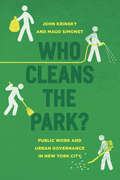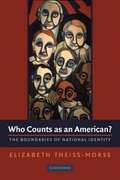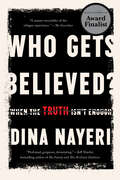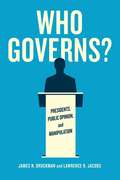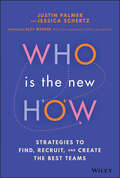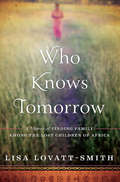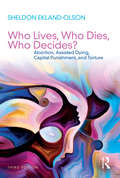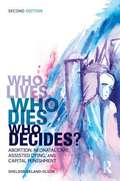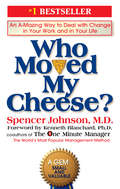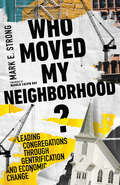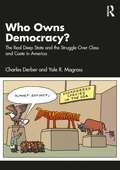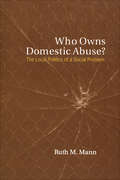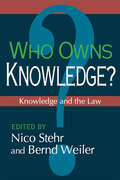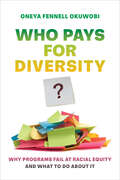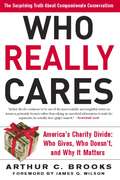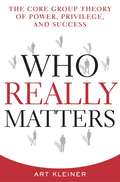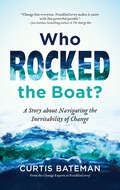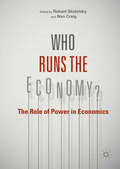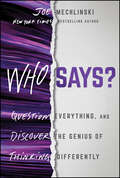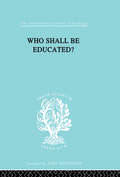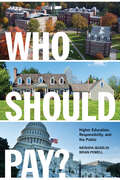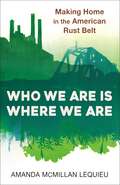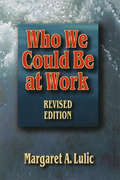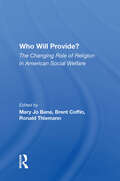- Table View
- List View
Who Cleans the Park?: Public Work and Urban Governance in New York City
by John Krinsky Maud SimonetAmerica’s public parks are in a golden age. Hundreds of millions of dollars—both public and private—fund urban jewels like Manhattan’s Central Park. Keeping the polish on landmark parks and in neighborhood playgrounds alike means that the trash must be picked up, benches painted, equipment tested, and leaves raked. Bringing this often-invisible work into view, however, raises profound questions for citizens of cities. In Who Cleans the Park? John Krinsky and Maud Simonet explain that the work of maintaining parks has intersected with broader trends in welfare reform, civic engagement, criminal justice, and the rise of public-private partnerships. Welfare-to-work trainees, volunteers, unionized city workers (sometimes working outside their official job descriptions), staff of nonprofit park “conservancies,” and people sentenced to community service are just a few of the groups who routinely maintain parks. With public services no longer being provided primarily by public workers, Krinsky and Simonet argue, the nature of public work must be reevaluated. Based on four years of fieldwork in New York City, Who Cleans the Park? looks at the transformation of public parks from the ground up. Beginning with studying changes in the workplace, progressing through the public-private partnerships that help maintain the parks, and culminating in an investigation of a park’s contribution to urban real-estate values, the book unearths a new urban order based on nonprofit partnerships and a rhetoric of responsible citizenship, which at the same time promotes unpaid work, reinforces workers’ domination at the workplace, and increases the value of park-side property. Who Cleans the Park? asks difficult questions about who benefits from public work, ultimately forcing us to think anew about the way we govern ourselves, with implications well beyond the five boroughs.
Who Counts as an American? The Boundaries of National Identity
by Elizabeth Theiss-MorseWhy is national identity such a potent force in people's lives? And is the force positive or negative? In this thoughtful and provocative book, Elizabeth Theiss-Morse develops a social theory of national identity and uses a national survey, focus groups, and experiments to answer these important questions in the American context. Her results show that the combination of group commitment and the setting of exclusive boundaries on the national group affects how people behave toward their fellow Americans. Strong identifiers care a great deal about their national group. They want to help and to be loyal to their fellow Americans. By limiting who counts as an American, though, these strong identifiers place serious limits on who benefits from their pro-group behavior. Help and loyalty are offered only to 'true Americans,' not Americans who do not count and who are pushed to the periphery of the national group.
Who Gets Believed?: When the Truth Isn't Enough
by Dina NayeriNational Book Critics Circle FinalistFinalist for the Dayton Literary Peace Prize"Dina Nayeri's powerful writing confronts issues that are key to the refugee experience."—Viet Thanh Nguyen From the author of The Ungrateful Refugee—finalist for the Los Angeles Times Book Prize and the Kirkus Prize—Who Gets Believed? is a groundbreaking book about persuasion and performance that asks unsettling questions about lies, truths, and the difference between being believed and being dismissed in situations spanning asylum interviews, emergency rooms, consulting jobs, and family lifeWhy are honest asylum seekers dismissed as liars?Former refugee and award-winning author Dina Nayeri begins with this question, turning to shocking and illuminating case studies in this book, which grows into a reckoning with our culture&’s views on believability. From persuading a doctor that she&’d prefer a C-section to learning to &“bullshit gracefully&” at McKinsey to struggling, in her personal life, to believe her troubled brother-in-law, Nayeri explores an aspect of our society that is rarely held up to the light.For readers of David Grann, Malcolm Gladwell, and Atul Gawande, Who Gets Believed? is a book as deeply personal as it is profound in its reflections on morals, language, human psychology, and the unspoken social codes that determine how we relate to one another.
Who Governs?: Presidents, Public Opinion, and Manipulation
by Lawrence R. Jacobs James N. DruckmanAmerica’s model of representational government rests on the premise that elected officials respond to the opinions of citizens. This is a myth, however, not a reality, according to James N. Druckman and Lawrence R. Jacobs. In Who Governs?, Druckman and Jacobs combine existing research with novel data from US presidential archives to show that presidents make policy by largely ignoring the views of most citizens in favor of affluent and well-connected political insiders. Presidents treat the public as pliable, priming it to focus on personality traits and often ignoring it on policies that fail to become salient. Melding big debates about democratic theory with existing research on American politics and innovative use of the archives of three modern presidents--Johnson, Nixon, and Reagan--Druckman and Jacobs deploy lively and insightful analysis to show that the conventional model of representative democracy bears little resemblance to the actual practice of American politics. The authors conclude by arguing that polyarchy and the promotion of accelerated citizen mobilization and elite competition can improve democratic responsiveness. An incisive study of American politics and the flaws of representative government, this book will be warmly welcomed by readers interested in US politics, public opinion, democratic theory, and the fecklessness of American leadership and decision-making.
Who Is Knowledgeable Is Strong: Science, Class, and the Formation of Modern Iranian Society, 1900-1950
by Cyrus SchayeghCyrus tells two intertwined stories: how, in early 20th-century Iran, an emerging middle class used modern scientific knowledge as its cultural and economic capital, and how, along with the state, it employed biomedical sciences to tackle presumably modern problems.
Who Is the New How: Strategies to Find, Recruit, and Create the Best Teams
by Justin Palmer Jessica SchertzRecruit, create, and retain the best teams In Who Is the New How: Strategies to Find, Recruit, and Create the Best Teams, a team of accomplished talent experts delivers a hands-on roadmap to filling your most mission-critical roles with the best people. In the book, you’ll explore strategies that guide the world’s most innovative companies and high-performing organizations as they scour the globe to build impactful, productive teams. You’ll learn how to reimagine your talent acquisition strategy, from who you’re looking for to how you should recruit them. You’ll also discover how and why to say goodbye to familiar phrases like, “just get a butt in the seat,” and counter-productive metrics like “time-to-fill.” The authors also explain: Why identifying candidates aligned with your company’s mission and culture is so critical to long-term talent success How using the right combination of technology and human expertise in the recruitment process can be the key to winning top talent What building teams filled with the right people can do for your team’s morale and ultimately make companies successfulA revolutionary new approach to one of the most critical issues facing organizations today, Who Is the New How is the talent playbook that business and HR leaders have been waiting for.
Who Knows Tomorrow: A Memoir of Finding Family among the Lost Children of Africa
by Lisa Lovatt-SmithBorn in Spain and raised by a struggling single mother, Lisa Lovatt-Smith became an editor at British Vogue at nineteen, the youngest in Condé Nast history. She helped launch Spanish Vogue and partied across Europe with celebrities, fashion designers, photographers, and supermodels. By her thirties, Lisa has her dream career and a glamorous life in Paris, but when her adopted daughter Sabrina is expelled from school, Lisa takes her to volunteer in a Ghanaian orphanage in the hopes of getting her back on track. What she discovers there changes both their lives for good. Appalled by the deplorable conditions she finds, Lisa moves to Ghana permanently and founds OAfrica, dedicating her personal resources to reuniting hundreds of Ghanaian children with their families and spearheading a drive to shut down corrupt orphanages. On this unforgettable journey, Lisa confronts death threats, malaria, arson, and heartbreaking poverty; she also discovers truly inspiring children trapped in limbo by a moneymaking scheme bigger than she ever imagined. Who Knows Tomorrow is the engaging, frank, and often surprisingly funny story of one amazing woman who has traveled the globe in search of meaningful connection. Although to Lisa her story will always be about the children, it’s also a touching celebration of a woman who is talented, generous, and unfailingly courageous.
Who Lives, Who Dies, Who Decides?: Abortion, Assisted Dying, Capital Punishment, and Torture (Sociology Re-Wired)
by Sheldon Ekland-OlsonWho Lives, Who Dies, Who Decides? looks at several of the most contentious issues in many societies. The book asks, whose rights are protected? How do these rights and protections change over time, and who makes those decisions? This book explores the fundamentally sociological processes which underlie the quest for morality and justice in human societies. The author sheds light on the social movements and social processes at the root of these seemingly personal moral questions. The third edition contains a new chapter on torture entitled, "Taking Life and Inflicting Suffering."
Who Lives, Who Dies, Who Decides?: Abortion, Neonatal Care, Assisted Dying, and Capital Punishment
by Sheldon Ekland-OlsonThis second edition of Who Lives, Who Dies, Who Decides? has been updated to consider the rising stakes for issues of life and death. Abortion, assisted dying, and capital punishment are among the most contentious issues in many societies and demand debate. Whose rights are protected? How do these rights and protections change over time and who makes those decisions? Based on the author's award-winning and hugely popular undergraduate course at the University of Texas and highly recommended by Choice Magazine, this book explores the fundamentally sociological processes which underlie the quest for morality and justice in human societies. The Author's goal is not to advocate any particular moral "high ground" but to shed light on the social movements and social processes which are at the root of these seemingly personal moral questions and to develop readers to develop their own opinions.
Who Moved My Cheese?: An A-Mazing Way to Deal with Change in Your Work and in Your Life (Grin And Ferret Ser.)
by Spencer JohnsonWho Moved My Cheese? is an amusing and enlightening story of four characters who live in a maze and look for cheese to nourish them and make them happy. Cheese is a metaphor for what you want to have in life - whether it is a good job, a loving relationship, money or a possession, health or spirital peace of mind. And the maze is where you look for what you want - the organisation you work in, or the family or community you live in. This profound book from bestselling author, Spencer Johnson, will show you how to anticipate change, adapt to change quickly, enjoy change and be ready to change quickly again and again. Discover the secret for yourself and learn how to deal with change, so that you suffer from less stress and enjoy more success in your work and in life. Written for all ages, this story takes less than an hour to read, but its unique insights can last for a lifetime.
Who Moved My Neighborhood?: Leading Congregations Through Gentrification and Economic Change
by Mark E. StrongNeighborhoods are moving.Who Moved My Neighborhood?
Who Owns Democracy?: The Real Deep State and the Struggle Over Class and Caste in America
by Charles Derber Yale R. MagrassThis book uniquely reverses today’s MAGA conspiratorial concept of the deep state to reveal how a very real “deeper state” is evident throughout history, back to the founding of American democracy.Class and caste-based elites and their political allies have held dominant power in the US. Large corporations, Wall Street, and other sectors of the capitalist class outsource day-to-day governance to the mainstream political parties, which can compete vigorously and create a credible veneer of civil liberties and electoral democracy, disguising and legitimating the deep state. But it is a “shallow democracy,” since the deep state sets boundaries on policies and choices to serve itself. It also denies a universal franchise and obstructs the voting rights of people of color, the poor, and other communities threatening to the deep state. Moreover, the deep state constrains civic governance in the workplace and community, denying virtually all working people democratic control over their economic and social life.Shallow democracy has a long history. Two embryonic deep states – a Northern capitalist deep state and a Southern slave-based deep state – came together in a tense and unstable union to create and govern the US. While the Confederate deep state, which we call proto-American fascism, was defeated in the Civil War, it left a deep imprint on the culture and politics of millions of Americans, and has resurged again in Trumpism. The shallow democracy of the capitalist deep state has survived previous challenges, but it lacks the deep roots that guarantees its survival.The authors point to prospects for meaningful change arising from the extreme economic chasm dividing the nation economically and racially, and from existential crises of the survival of democracy and of a sustainable planet. They discuss strategy that might finally move the nation beyond MAGA toward deep democracy.
Who Owns Domestic Abuse?: The Local Politics of a Social Problem
by Ruth MannWith the knowledge and sensitivity of a teacher and counsellor, Ruth M. Mann details a community effort to establish a shelter for abused women in a small Ontario municipality. While other literature presents the ostensibly cohesive views of particular interest groups on the issue of domestic violence, Mann exposes the conflicts that actually occur, and the ways these conflicts fuel unintended outcomes. In Who Owns Domestic Abuse? The Local Politics of a Social Problem, the author ventures bravely into the politically charged debate over the definition of abuse, and emphasizes the fact that 'owning' a problem does not ensure the possession of viable answers. Rather than promoting a particular response to such problems, Mann uses personal accounts of abuse to make a space for the diverse perspectives of abused women and abusive men. She urges activists and intervenors to argue less and listen more.
Who Owns Knowledge?: Knowledge and the Law
by Bernd WeilerWho Owns Knowledge? explores the emerging linkages between the extension of knowledge and the law. It anticipates that the legal system will not only be called upon to adjudicate in matters of creative minds, but will be expected to do so to an ever increasing degree.Linkages between the legal system and knowledge are bound to multiply in modern societies. Ironically, while increasingly relying on knowledge, we are simultaneously investing significant resources into controlling this same knowledge. This includes developing a system of legal governance over how knowledge is extended or enlarged. Such modes of governance may take the form of regulatory legal codes, or legal challenges and judgments that shape the evolution of modern society and potentially transform knowledge itself, as a productive force. Who Owns Knowledge? asks such questions as: What is the appropriate balance of public and private interests involved in this process? How can creative powers, natural resources and indigenous knowledge be protected from either public or private exploitation? Does the law have the power to prevent this exploitation, or is adaptive technology needed? Also, in this identity theft conscious age, how can the rights of the individual be protected against policies allowing access to any kind of information, especially confidential information? The editors and contributors demonstrate that the relationship between knowledge and the law needs to be further researched and discussed. Who Owns Knowledge? is a must-read for those interested in the subjects of intellectual property, the history and development of modern legal and economic systems and their entanglements, and how judicial systems make choices between the legal and economic systems and, especially, between the public and private good and their often opposing interests.
Who Pays for Diversity?: Why Programs Fail at Racial Equity and What to Do about It
by Oneya Fennell OkuwobiHow diversity initiatives harm employees of color by turning them into workplace commodities. Diversity programs are under attack. Should those interested in racial justice fight to keep them, or might there be another way forward? Who Pays for Diversity? reveals the costs that employees of color pay under current programs by having their racial identities commodified to benefit white people and institutions. Oneya Fennell Okuwobi proposes fresh and thoughtful ways to reorient these initiatives, move beyond tokenism, and authentically center marginalized employees. Drawing on accounts of employees from across the workplace spectrum, from corporations to churches to universities, Who Pays for Diversity? details how the optics of diversity programs undermine employees' competence while diminishing their well-being and workplace productivity. Okuwobi argues that diversity programs have been a costly detour on the path to racial justice, and getting back on track requires solutions that provide equity, dignity, and agency to all employees, instead of defending the status quo.
Who Really Cares: The Surprising Truth About Compassionate Conservatism -- America's Charity Divide -- Who Gives, Who Doesn't, and Why It Matters
by Arthur C. BrooksWe all know we should give to charity, but who really does? In his controversial study of America's giving habits, Arthur C. Brooks shatters stereotypes about charity in America-including the myth that the political Left is more compassionate than the Right. Brooks, a preeminent public policy expert, spent years researching giving trends in America, and even he was surprised by what he found. In Who Really Cares, he identifies the forces behind American charity: strong families, church attendance, earning one's own income (as opposed to receiving welfare), and the belief that individuals-not government-offer the best solution to social ills. But beyond just showing us who the givers and non-givers in America really are today, Brooks shows that giving is crucial to our economic prosperity, as well as to our happiness, health, and our ability to govern ourselves as a free people.
Who Really Matters: The Core Group Theory of Power, Privilege, and Success
by Art KleinerIn a breakthrough Organization Man for the twenty-first century, bestselling author Art Kleiner reveals that every organization is driven by a desire to satisfy a Core Group of influential individuals and explains why understanding this group’s expectations is the key to success.When corporate leaders announce, with seeming sincerity, “We make our decisions on behalf of our shareholders,” their words are taken at face value. But as recent news stories prove, this imperative is routinely violated. In Who Really Matters, Art Kleiner argues that the dissonance between a declared mission and actual operation can be seen at organizations large and small. All organizations have one motive in common. Every decision—which projects to back, who to promote, or how to spend money—is affected by the perceived wants and needs of a core group of people “who really matter.” The composition of the group can differ from organization to organization. Often, the most senior people in the hierarchy are members—but not always. Sometimes, the people who “matter” can extend far down the corporate ladder, or even reach outside the company to include key customers, labor union leaders, and stockholders. Kleiner gives readers clues about how to identify a core group’s real mission by observing its day-to-day actions, listening to the fundamental message it sends employees, examining its management of new members; understanding the ideas that shape its policies about management, money, and the way the world works; and avoiding the taboos governing the way it operates.Whether you’re a member of the Core Group—or want to be—this deft, engaging blend of argument and observation, anecdotes and advice, is the one guide you’ll need to achieve your career goals and aspirations by navigating the hidden pathways in any organization, large or small.
Who Rocked the Boat?: A Story about Navigating the Inevitability of Change
by Curtis BatemanLearn How to Turn Change into Opportunity“Change is not merely necessary to life—it is life.” –Alvin TofflerIn this FranklinCovey book on responding to change, explore your own experiences with change using a river journey parable as a point-of-reference. Take this voyage and discover timeless principles and timely results from an industry leader who has helped numerous organizations turn disruptive change into individual and collective opportunity. Who Rocked the Boat? We all travel along various rivers in life, which means at any moment we can find ourselves navigating their uncertainty—whether a global pandemic, a new boss, a shift in employment, business restructuring, a new role on a team, starting a new course in school, a new business strategy, the birth of a child, divorce, or responding to a setback on a project or personal goal.Shift happens! Change is going to happen. It’s a fact of life. Understanding your reactions and making good choices could make the difference between capitalizing on an opportunity or resisting and missing an important chance.The FranklinCovey Change Model. While every change is unique, there is a predictable pattern to change, and understanding this pattern and building the skills to navigate it is often the difference between success and failure. The FranklinCovey Change Model provides the structure necessary to orient, ground, and gain clarity about change. Then, like the ship’s crew in the river journey parable, we can use the model as a map to chart our way forward: making key decisions, adopting new behaviors, and building ideal conditions for innovation. Today, with change coming at us in fast and increasingly disruptive ways, understanding The Change Model is more important than ever.If books such as Together Is Better by Simon Sinek, The Five Dysfunctions of a Team by Patrick Lencioni, or Who Moved My Cheese? by Spencer Johnson have been valuable, you will want to read Who Rocked the Boat? [
Who Runs the Economy?
by Robert Skidelsky Nan CraigSince the financial crisis of 2008 and the following Great Recession, there has been surprisingly little change in the systems of ideas, institutions and policies which preceded the crash and helped bring it about. 'Mainstream' economics carries on much as it did before. Despite much discussion of what went wrong, very little has substantially changed. Perhaps the answer has something to do with power; a subject on which economics is unusually quiet. Whilst economics may be able to discuss bargaining power and market power, it fails to explore the reciprocal connections between economic ideas and politics: the political power of economic ideas on the one side, and the influence of power structures on economic thought on the other. This book explores how the supposedly neutral discipline of economics does not simply describe human behaviour, but in fact shapes it.
Who Says?: Question Everything and Discover the Genius of Thinking Differently
by Joe MechlinskiWhy blend in when you were born to stand out? Who Says? Question Everything and Discover the Genius of Thinking Differently is a manifesto for those who refuse to live life on autopilot. This book dares you to ask the questions no one else is asking, to defy the gravitational and seductive pull of the status quo, and to embrace a life of authenticity and boundless innovation. An invitation to venture into the unknown and transform you from a mere reader into a trailblazer, you'll learn about the grounding-breaking spaces of psychedelic therapy, the transformative powers of artificial intelligence, and the dismantling of outdated workplace hierarchies. This book is your companion in uncharted territory, where the only rule is to question everything. Inside this book you'll find powerful ideas for: Living Disruptively: Embrace disruption as a catalyst for living with purpose, energy, and inspiration. This book guides you to a life by design, not default. Finding Your True North: Discover how to identify and align with your core values, transforming them into a compass that guides you through life's storms. Cultivating Personal Sovereignty through Creativity: Learn how deliberate creative acts can anchor your personal sovereignty, turning everyday actions into powerful statements of autonomy and originality. Who Says? is your invitation to a journey of discovery and defiance. Designed for the visionaries, the rebels, the entrepreneurs, the executives, the innovators, the dreamers, and the creators, Who Says? is a reflection of the boundless potential lying within you, unexplored. It's for the new generation of leaders who are not afraid to question everything and lead with their inner guidance. Learn to not just question the world around you, but find the courage to question yourself, to dig deep, and to emerge as the architect of your own destiny.
Who Shall Be Educated? Ils 241 (International Library of Sociology)
by W. Lloyd Warner Robert J. Havighurst Martin B. LoebFirst Published in 1998. Routledge is an imprint of Taylor & Francis, an informa company.
Who Should Pay? Higher Education, Responsibility, and the Public: Higher Education, Responsibility, and the Public
by Brian Powell Natasha QuadlinAmericans now obtain college degrees at a higher rate than at any time in recent decades in the hopes of improving their career prospects. At the same time, the rising costs of an undergraduate education have increased dramatically, forcing students and families to take out often unmanageable levels of student debt. The cumulative amount of student debt reached nearly $1.5 trillion in 2017, and calls for student loan forgiveness have gained momentum. Yet public policy to address college affordability has been mixed. While some policymakers support more public funding to broaden educational access, others oppose this expansion. Noting that public opinion often shapes public policy, sociologists Natasha Quadlin and Brian Powell examine public opinion on who should shoulder the increasing costs of higher education and why. Who Should Pay? draws on a decade’s worth of public opinion surveys analyzing public attitudes about whether parents, students, or the government should be primarily responsible for funding higher education. Quadlin and Powell find that between 2010 and 2019, public opinion has shifted dramatically in favor of more government funding. In 2010, Americans overwhelming believed that parents and students were responsible for the costs of higher education. Less than a decade later, the percentage of Americans who believed that federal or state/local government should be the primary financial contributor has more than doubled. The authors contend that the rapidity of this change may be due to the effects of the 2008 financial crisis and the growing awareness of the social and economic costs of high levels of student debt. Quadlin and Powell also find increased public endorsement of shared responsibility between individuals and the government in paying for higher education. The authors additionally examine attitudes on the accessibility of college for all, whether higher education at public universities should be free, and whether college is worth the costs. Quadlin and Powell also explore why Americans hold these beliefs. They identify individualistic and collectivist world views that shape public perspectives on the questions of funding, accessibility, and worthiness of college. Those with more individualistic orientations believed parents and students should pay for college, and that if students want to attend college, then they should work hard and find ways to achieve their goals. Those with collectivist orientations believed in a model of shared responsibility – one in which the government takes a greater level of responsibility for funding education while acknowledging the social and economic barriers to obtaining a college degree for many students. The authors find that these belief systems differ among socio-demographic groups and that bias – sometimes unconscious and sometimes deliberate – regarding race and class affects responses from both individualistic and collectivist-oriented participants. Public opinion is typically very slow to change. Yet Who Should Pay? provides an illuminating account of just how quickly public opinion has shifted regarding the responsibility of paying for a college education and its implications for future generations of students.
Who We Are Is Where We Are: Making Home in the American Rust Belt
by Amanda McMillan LequieuHalf a century ago, deindustrialization gutted blue-collar jobs in the American Midwest. But today, these places are not ghost towns. People still call these communities home, even as they struggle with unemployment, poverty, and other social and economic crises. Why do people remain in declining areas through difficult circumstances? What do their choices tell us about rootedness in a time of flux?Through the cases of the former steel manufacturing hub of southeast Chicago and a shuttered mining community in Iron County, Wisconsin, Amanda McMillan Lequieu traces the power and shifting meanings of the notion of home for people who live in troubled places. Building from on-the-ground observations of community life, archival research, and interviews with long-term residents, she shows how inhabitants of deindustrialized communities balance material constraints with deeply felt identities. McMillan Lequieu maps how the concept of home has been constructed and the ways it has been reshaped as these communities have changed. She considers how long-term residents navigate the tensions around belonging and making ends meet long after the departure of their community’s founding industry.Who We Are Is Where We Are links the past and the present, rural and urban, to shed new light on life in postindustrial communities. Beyond a story of Midwestern deindustrialization, this timely book provides broader insight into the capacious idea of home—how and where it is made, threatened, and renegotiated in a world fraught with change.
Who We Could Be at Work
by Margaret LulicFirst published in 1996. This empowering business book addresses personal and organizational transformation. It provides practical insights and real models of change. Margaret Lulic creates a vision for change by showing how every individual, company and action are inter-connected.
Who Will Provide? The Changing Role Of Religion In American Social Welfare
by Mary Jo BaneLeading scholars examine how the church, community organizations, and the government must work together to provide for America's poor in the aftermath of welfare reform. . Who will provide for Americas children, elderly, and working families? Not since the 1930s has our nation faced such fundamental choices over how to care for all its citizens. Now, amid economic prosperity, Americans are asking what government, business, and non-profit organizations can and can’t do and what they should and shouldn’t be asked to do. As both political parties look to faith-based organizations to meet material and spiritual needs, the center of this historic debate is the changing role of religion. These essays combine a fresh perspective and detailed analysis on these pressing issues. They emerge from a three-year Harvard Seminar sponsored by the Center for the Study of Values in Public Life that brought together scholars in public policy, government, religion, sociology, law, education, and non-profit leadership. By putting the present moment in broad historical perspective, these essays offer rich insights into the resources of faith-based organizations, while cautioning against viewing their expanded role as an alternative to the government’s responsibility. In Who Will Provide? community leaders, organizational managers, public officials, and scholars will find careful analysis drawing on a number of fields to aid their work of devising better partnerships of social provision locally and nationally. It was named a Choice Outstanding Academic Book of 2001..
